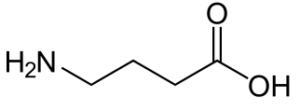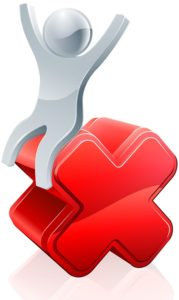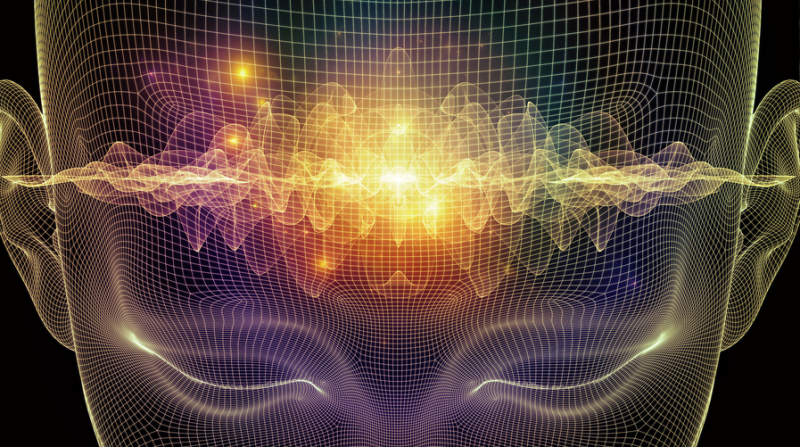Table of Contents
Key Takeaways
- GABA (Gamma-Aminobutyric Acid) is a crucial neurotransmitter that contributes to stress relief, relaxation, and improved sleep quality.
- It deviates from other neurotransmitters due to its inhibitory nature, serving to slow down neuron firing and calm the nervous system.
- While not as potent as some other nootropics, GABA’s effects are pronounced and significant, offering potential benefits like reduced anxiety, stress, and promoting better sleep.
- GABA is generally safe for consumption within the suggested dosage range of 500 – 1000 mg per day.
GABA (gamma-aminobutyric acid) is an amino acid and neurotransmitter. GABA is the primary inhibitory neurotransmitter of your central nervous system. Its role is to keep glutamate, the primary excitatory transmitter, from overwhelming you.
Too much glutamate can cause a seizure, and too much GABA can put you in a coma. A healthy brain maintains a critical balance of GABA and glutamate.
GABA acts like a “brake” on neuron circuits during stress. Low GABA levels can result in anxiety, insomnia, poor mood and restlessness.
Clinical studies show that boosting GABA with a supplement relieves anxiety, stress, and boosts the production of alpha brain waves.[i] If GABA is optimized in your brain you’ll feel focused, relaxed and stress-free.
GABA helps:
- Balance mood. GABA has an inhibitory effect on overly stimulated neurons. Low GABA levels lead to anxiety, depression and insomnia. GABA helps restore that balance. Promoting a more positive mood which improves focus and relaxation.
- Boost Human Growth Hormone. Bodybuilders and athletes use GABA before resistance training. Studies show GABA supplements boost blood levels of Human Growth Hormone. Promoting greater recovery support and lean muscle.
- Recovery from addiction. Some addiction doctors have been administering drugs that enhance the brain’s GABA-receptors. Normalizing GABA receptors takes away the craving and anxiety that one would typically experience in the absence of the addictive drug.
What is GABA?
Gamma-aminobutyric acid (GABA) is the major inhibitory or relaxing neurotransmitter in your brain.[ii] GABA’s primary role is to keep the major excitatory neurotransmitter glutamate in check.

GABA isa naturally occurring amino acid synthesized in brain cells from glutamate. It’s estimated that 40% of the synapses in the human brain work with GABA and therefore have GABA receptors.
GABA enhances normal sleep cycles, and improves blood pressure. GABA stimulates the pituitary gland to secrete Human Growth Hormone. And helps produce endorphins that make you feel good after a workout or sex.
When you normalize GABA levels you’ll experience a reduction in anxiety, insomnia, nervousness, restlessness, lowering blood pressure, and stress.
Benzodiazepine drugs like Valium and Xanax work by increasing GABA receptor sensitivity.[iii]
How do GABA Receptors Work in the Brain?
There are two natural GABA signaling receptors on nerve cells — GABA-A receptor and GABA-B receptor. While each works differently, when GABA binds to one of these receptors, the result is a decrease in that nerve cell’s responsiveness. This means that GABA modulates the signals that nerve cells are able to send.
GABA helps brain health and function in several ways. But two in particular stand out.
- GABA as one of two major inhibitory neurotransmitters works by preventing neural signaling associated with anxiety from reaching other neurons. It does this by attaching to the receptors that would otherwise excite those neurons. Over-stimulating neurons in certain areas of your brain is what causes anxiety-related symptoms.
Researchers in Japan studied the calming effects of GABA with 8 volunteers. They had study subjects cross a suspension bridge as the stressful stimulus. The placebo subjects in this group showed significant drops in blood level markers indicating high stress levels. While the GABA group showed significantly higher blood levels of these same markers.
The placebo subjects in this group showed significant drops in blood level markers indicating high stress levels. While the GABA group showed significantly higher blood levels of these same markers.
GABA worked as a natural relaxant and its effects could be seen within 1 hour of taking GABA. The researchers concluded that GABA could enhance immunity from stress.[iv]
- GABA also helps decrease Beta brain waves and increase Alpha brain waves.[v] Beta brain waves are important for attention, alertness, concentration and developing memories. But excess levels of concentration, particularly during stress, can lead to anxiety, depression, insomnia and more stress.
When you are in an alert state, both Alpha and Beta brain waves can be stimulated. But the type of alertness will determine which brain wave is produced.
Alertness during an Alpha wave state is associated with a relaxed state. And a stressed alert state produces a Beta wave. But an excess of Beta brain waves contributes to a variety of nervous disorders including anxiety and stress.
As a side note, I’m writing this while listening to binaural music which produces an Alpha state. It allows for a relaxed environment which promotes creativity and productivity.
How things go bad with low GABA
Low levels of GABA are associated with a variety of health problems.
↑ Anxiety[vi], panic attacks, stress and insomnia
↑ Muscle spasms, hypertension, convulsion, Tourette’s Syndrome and epilepsy
↑ Dry skin and wrinkles
↑ Poor digestion, bloating, flatulence, and constipation
When your neurotransmitters, including GABA, are in balance, you feel motivated, productive and energetic. And you feel calm and relaxed during downtime.
When GABA levels are low you feel filled with dread, you’re constantly worried, you have racing thoughts, and you’re frequently late and disorganized.[vii]
Many people in this GABA-slump resort to high carbohydrate foods, and drugs or alcohol to relax.
GABA benefits
The amino acid L-glutamine is the precursor to GABA production in your body. L-Glutamine is a precursor the synthesis of L-glutamate. Glutamate is your body’s most abundant excitatory neurotransmitter. Which is responsible for attention span, brain energy, learning ability, memory, and staying awake. 
An enzyme called glutamate decarboxylase converts glutamate to GABA. It does it with the help of the active form of Vitamin B6 (Pyridoxal-5-Phosphate (P5P)).
The amino acid taurine helps increase the communication and productivity of this enzyme. And zinc helps the release of GABA from its receptors.
When this process works efficiently, you feel relaxed with no stress or feelings of anxiety. And if you are dealing with insomnia symptoms you should get a more restful night’s sleep.
How does GABA feel?
When you balance GABA levels in your brain, you feel relaxed and calm.
But will it work if you take it as a supplement? Animal research conducted in the past showed that GABA supplementation had no effect. Speculation was that the GABA molecule is too large to cross the blood-brain barrier.[viii]
But it turns out that more recent research and with humans shows that when GABA is taken as a supplement it is effective.
Neurohackers who supplemented with GABA reported feeling much calmer overall. Intrusive thoughts became less frequent and were much easier to manage.
Instead of feeling overwhelmed, they were able to focus on the present moment without being constantly distracted by negative thoughts.
Many others say that if they take GABA before bedtime, they’re out like a light and without an hour of brain gymnastics
Within 30 minutes of taking a GABA supplement you should feel relaxed but not drowsy. You should feel like your normal self but without the anxious panic feeling.
Many say that this supplement does wonders in restoring healthy sleep patterns and that they can now sleep through the night
Some report that using GABA helped reduce tension headaches.
The tightness in their chest is gone, their overall mood is softened, and they no longer cry at work from frustration or rage.
GABA should start providing its benefits within 15-30 minutes. Racing thought subside, their mind relaxes and stops bouncing from one thought to another. Which means they can now focus on the task at hand.
Several people reported that PharmaGABA® helped them quit prescription medications for insomnia.
GABA is found in your adrenal glands, pituitary gland, pancreas and your sex organs.[x] GABA is also anti-inflammatory, and has an immune benefit. When all these are running optimally, you’ll feel good.
We’ll also cover other ways to boost GABA levels in our brain in the “Type of GABA to Buy” section of this article.
GABA Clinical Research
GABA was identified as a neurotransmitter several decades ago. And there had been a lot of research on GABA published since. But most of it is focused on how GABA works. And the drugs and chemicals which affect its action.
There is very little research available on using GABA as a supplement. Likely because many scientists believe that taking GABA as a supplement will not cross into the brain
GABA Increases Human Growth Hormone
 Bodybuilders and athletes use supplementary GABA to help repair and support muscle function. And there are several studies supporting the notion that GABA increases Human Growth Hormone.
Bodybuilders and athletes use supplementary GABA to help repair and support muscle function. And there are several studies supporting the notion that GABA increases Human Growth Hormone.
In one study, researchers worked with 19 subjects who were given a single oral dose of 5 grams of GABA. 18 subjects were given a placebo during this trial.
3 hours after the administration of GABA, blood samples were taken. The team reported that “GABA caused a significant elevation of plasma growth hormone levels”.[xi]
GABA helps Reduce Insomnia
A Los Angeles study conducted a randomized, double-blind, placebo controlled trial with 18 patients with sleep disorders. The patients received either a placebo, or Gabadone (a combination of GABA and 5-hydroxytryptophan).
The difference between the two groups of sleep-deprived patients was significant. The Gabadone group fell asleep faster, stayed asleep longer, and had a better quality of sleep than the placebo group.[xii]
GABA Recommended Dosage
The recommended daily GABA supplement dosage is 500 to 1000 mg for a relaxation or calming effect.
Some neurohackers notice an immediate relaxing effect, while others need to take it for a couple weeks before it starts to kick in.
L-Arginine which increases nitric oxide may also help supplementary GABA cross the blood-brain barrier.[xiii]
PharmaGABA™ which is a natural form of GABA produced with the help of Lactobacillus hilgardii bacteria is dosed at 250 – 300 mg per day.
GABA Side Effects
GABA is considered very safe when taken in normal recommended doses.
Bodybuilders who use much higher doses of GABA do report experiencing flushing, tingling, a spike in heart rate and blood pressure, and anxiety.
Type of GABA Supplements to Buy
You can take GABA food supplements in the form of a tablet, capsule and powder.
Some studies report that GABA does not readily cross the blood-brain barrier. But others do show GABA can cross this barrier. And many Neurohackers report feeling a calming effect when using GABA.
PharmaGABA™ is a natural form of GABA made using Lactobacillus hilgardii bacteria. The same bacteria used to ferment vegetables when making the Korean cabbage dish called kimchi. This form seems to be effective in helping mood.
Another safe way to change the way GABA functions in the brain is to use any of several commonly used herbs, vitamins and minerals.
Passionflower, Valerian root[xiv], American Ginseng and Kava Kava work by increasing the effect of GABA on its receptors.
Extracts of green, black and oolong tea also elicit a GABA effect.[xv]
Magnesium binds to GABA receptor sites and increases its effect.[xvi]
Taurine protects against glutamate over-stimulation. And this inhibitory effect acts as an anxiolytic (anti-anxiety).
The neurotransmitter Serotonin enhances GABA. So precursors to Serotonin like tryptophan and 5-HTP can increase GABA action in the brain.
The amino acid Theanine in tea provides a calming effect. Theanine inhibits glutamate uptake which would increase GABA levels in the brain.[xvii]
Suntheanine®, which is a branded from of L-Theanine is also found in some pre-formulated nootropic stacks.
And Phenibut, which is a derivative of GABA developed in Russia, also increases levels of GABA in the brain. While some report that Phenibut causes drowsiness and fatigue, it can be a safer way to boost GABA than with a pharmaceutical like Valium or Xanax. But please see my warnings on Phenibut before you decide to try it. And note that Phenibut is no longer easily available in many countries including the USA.
Frequently Asked Questions
How good is GABA for anxiety?
GABA supplements may help reduce anxiety especially if you are GABA deficient. Many have found that when you normalize GABA levels you’ll experience a reduction in anxiety and stress, nervousness, and restlessness.
Who should not take GABA?
Do NOT use GABA if your are currently using any drug that affects GABA or GABA receptors. Benzos and barbiturates are contraindicated with GABA supplements because if you increase GABA too much you could put yourself into a coma.
Is GABA safe to take daily?
Yes, GABA is safe to use daily as long as you are not using medications that are contraindicated with GABA.
Is it safe to take GABA every night?
GABA is safe to use every night for most people. I personally use a PharmaGABA™ supplement every night before bed because it helps me sleep. But GABA supplements are NOT safe to use if you are using anti-anxiety medications that affect GABA and its receptors.
Nootropics Expert Recommendation
I recommend using GABA as a nootropic supplement if you’re feeling anxiety or stress. And to calm or keep in check some of the stimulatory effects of some nootropics.
Your body does make GABA on its own from glutamate in your brain. Most healthy people have an adequate supply of GABA.
But if you’re dealing with anxiety, mood disorders, or chronic stress and need some extra help in calming things down, GABA can help.
While GABA does not readily cross the blood-brain barrier, you have many other options available for regulating or boosting GABA, if GABA as a supplement doesn’t work for you.
I suggest trying a GABA supplement first at a dose of 500 mg.
Or try one of the readily available GABA supplements made by major supplement makers containing PharmaGABA™.
Another safe option for regulating GABA levels is to use a high quality multivitamin that contains Vitamin B6 and zinc which influences the way GABA works in your brain.
Check the “Type of GABA to buy” section of this article for details.










Join The Discussion - 275 comments
Aleksandar
January 10, 2019
Hi David,
Are GABA and dopamine levels co-dependent? In other words, I know that increased serotonin levels in prolonged period eventually causes dopamine depletion. Is it the same with GABA? Can overabudance of GABA cause drop in dopamine levels?
Thanks
David Tomen
January 10, 2019
Aleksandar, GABA and dopamine seem to codependent in certain brain regions. A recent study confirmed this: https://www.news-medical.net/news/20120322/Direct-link-between-GABA-activation-and-dopamine-suppression.aspx.
But I have not seen any evidence of a direct relationship similar to dopamine vs. serotonin interaction. I’ve not seen any evidence of this strong a relationship between dopamine levels and GABA.
Aleksandar
January 11, 2019
Thanks, David!
Paul
November 10, 2018
Hi David,
Did you ever write an article on how to repair a leaky blood brain barrier like mentioned in the Gaba section above.
Thank you,
Paul
David Tomen
November 10, 2018
Paul, I have not but as of yesterday that article has moved to the top of my list to write. It came up again on the survey I sent out last week. So stay tuned and thanks for your patience.
Gabriella
October 9, 2018
Hi David,
Thanks for this article on GABA. I’ve been trying to get my head around how GABA works in the brain and so appreciate your detailed article.
My question relates to a drug called Gabapentin which I’m currently on. So I thought this would be an appropriate place on your site to ask my question.
Just a quick background. I’ve been taking a strong prescribed dose of Gabapentin to keep mostly my anxiety due to Bipolar in check. I’ve only been on the dosage for 2 months but I feel awful! I can’t believe there are folks who like to abuse this drug!
Although, I have read that some folks suggest or use Gabapentin as a Nootropic. As for me, I never want to see it again, once I’m tapered off!
I believe I’m over medicated and have since dropped my dose by 200 mg per day, giving me 1000 mg per day. I’m seeing a new doctor soon who’s more naturally inclined. If I taper down 200 mg every 4 weeks, I’ll be off the drug in 20 weeks.
I can’t even begin to describe the terrible withdrawals from reducing by this small amount. But I’m adamant to get off this dangerous drug. So I’ll be dealing with the withdrawals like blurred vision, whole-brain headaches, pain, dizziness etc.
Anyway, from what I’ve read, it’s still unclear what the mechanism of Gabapentin is in the brain. But I did get this description:
“This prescription drug mimics the neurotransmitter gamma-aminobutyric acid (GABA) but does not bind to the GABA receptors in the brain, nor does it impact the transport of naturally produced GABA. However, by acting like GABA, gabapentin can calm interactions between neurons, making it an important anticonvulsant.”
I know you’re not a doctor and I’m not looking for medical advice. But rather your opinion of what you’d do in my shoes…
Considering the description of Gabapentin above, when can I start using the Nootropic stacks I’ve developed for myself? I’d like to start as soon as possible.
I’d like to use NAC, ALCAR, Tryptophan and Magnesium Threonate (for sleep). And later add Lithium Orotate (once I’ve had my thyroid labs done). And then of course fish oils, zinc, copper, vitamin C and Multi from Performance Lab.
Thanks for any pointers!
David Tomen
October 9, 2018
Gabriella, the detox issues with Gabapentin are similar to detoxing from certain nootropics that affect GABA including Phenibut and Picamilon. Unfortunately, all you can do is wean yourself off this med and let your body heal itself.
Use this to look up contraindications for Gabapentin: https://www.drugs.com/drug_interactions.html. Their list includes nootropics and other dietary supplements. Some of the nootropics in your stack should be OK while you are detoxing from Gabapentin. But please check that list carefully to make sure.
Robert Long
September 14, 2019
In regards to “withdrawal” is it the Receptor that is Damaged? Or a store of a Neurotransmitter that’s depleted?
Is there a way to supplement support for Brian healing? Like Lions Maine?
As for a Pharma GABA – does brand matter? Source?
David Tomen
September 15, 2019
Robert, withdrawal symptoms are the result of your brain and/or body going out of ‘homeostasis’ of whatever it is you were using. And typically happens after long-term use. Depending on the drug it could involve an imbalance of hormones, neurotransmitters, or some other system in your body.
Your body and brain is always looking for balance. But that balance can be altered with excessive or long-term use of some substance. Withdrawal symptoms subside once your system achieves a new balance.
Healing your brain is helped by providing the basic nutrients it needs including vitamins and minerals, certain antioxidants, hormones, etc. You can also assist this healing with things like Lion’s Mane for brain-derived neurotrophic factor and Nerve Growth Factor. Ashwagandha for axons, dendrites and synapses. And Vinpocetine or Pine Bark Extract for blood flow.
PharmaGABA is a patented form of GABA. Look for supplements that state on the label that they are using PharmaGABA.
Aleksandar
September 18, 2018
Hi!
Can i break the capsule containing GABA, dissolve it in water and drink (due to swallowing problems)? Thanks!
David Tomen
September 19, 2018
Yes
Chris
March 6, 2018
Hi, I enjoy the benefits of GABA supplement. It helps me so much with sleep and just general anxiety. However, is if safe to take this supplement every night before bed? Or will it cause dependence and withdrawal if I take it every day? How often should I take it? There is very little info on this.
David Tomen
March 7, 2018
Chris, using a GABA supplement daily should not cause dependence or withdrawal symptoms when you stop using it. Other GABA supplements like Phenibut will so please see the dosage notes and side effects of that review. For straight GABA please refer to the dosage notes in the review on this page.
Rosie Brown-Cooley
February 18, 2018
Hi Dave, man you’re a nootropics beast in the best way possible. Keep up the good work–is there anyone else out there doing what you do so far as actually studying the brain and finding the best possible nootropics both synthetic and natural to include stacks that have researched as much as you have done. I’m asking b/c I thought I came across one of your articles about not exciting the GABA receptors in the brain if you have used benzos and let me tell you I feel like the queen of benzos (about 15 years off and on) and have tried all types of tapering and weaning methods and I’m still looking for the right mix/combo; call it what you will–but I’m still batting a BIG FAT ‘”0″ so far as actually being able to get off of them. I’m basically at my wits end–so please tell me if you have a good stack of nootropics, I prefer natural that will help this pitiful, forgetful, lackluster, dull functioning brain of mines whip itself back into shape and heal itself and function like the good Lord intended it to. Just knowing that I can have my reasoning & logic skills not to mention short-term memory back would be “manna from heaven”.
Any suggestions would be great to get my ‘ol noggin back on the right track without doing any further damage to my cerebral inner workings is priceless.
David Tomen
February 19, 2018
Rosie, these nootropics have been compared to benzodiazepines in various clinical trials:
https://nootropicsexpert.com/ashwagandha/
https://nootropicsexpert.com/kava/
https://nootropicsexpert.com/phenibut/
https://nootropicsexpert.com/forskolin/
Also review this post I wrote dealing with anxiety > https://nootropicsexpert.com/best-nootropics-for-social-anxiety/
But first, a BIG word of caution. Be very, very careful about using any nootropics while on prescription meds. Read the dosage notes and side effects for each review. Then do a drug interaction search for the meds you are using and the nootropic you are considering here > https://www.drugs.com/drug_interactions.html
Some of the nootropics mentioned here and in the anxiety post also help repair the brain. And help things like memory.
kareeda-ni
January 14, 2020
Wow. I can very much relate to your story. It’s the very same reason I was drawn to research nootropics.
Benzo tolarance/withdrawal is a miserable predicament and medical protocols for dealing with it are pretty much nonexistent.
The neurochemistry of it is fairly well-explained in The Ashton Manual, wherein Dr. Heather Ashton of the UK explains that GABA-A receptors downregulate as a response to long-term administration of agonist drugs, leaving patients more apt to be overstimulated and anxious than was the case before treatment and abrupt discontinuation brings a host of punishing effects. For those on short-acting benzos, withdrawal effects of tolerant individuals can occur between daily therapeutic doses. That’s where I am now.
As I’ve had the pleasure of conversing with Mr. Tomen about, my personal neuro-hacking experiments have been primarily focused on supplements that tamp down the actions of glutamate and NMDA receptors.
I feel I’ll have better luck cushioning the jolt of withdrawals that happens when, absent “the brakes” of GABA, our excitatory channels show us their absolute worst in the form of tremors, spasms, anxiety, sensory hyper-acuity and depersonalization.
I would defer to Mr. Tomen on this matter, as I am, by no means, an expert. My own personal belief is that more GABA in the brain won’t matter much if there aren’t enough receptors left to bind with it.
There are Racitams reviewed on this site that research would indicate increases receptor density. I am very timid when it comes to these supplements and their potential stimulant effects in this trip-wired state I’m in. That and, as Dr. Ashton often states, the only reliable way to begin regrowing receptors is to completely detox which, in our case, can take years.
On the GABA side, I have found some early success with Lemon Balm which appears to slow the rate at which GABA is broken down so that it’s action might be prolonged. It has, when timed right, delayed crashes and extended my sleep. B6, being a co-factor of GABA synthesis in the gut, is also something I’m trying to get more of. CBD oil, known to have anti-seizure properties and a mechanism for increasing GABA binding affinity is another a go-to for me.
Magnesium L-Threonate, (shown to be a particularly good mag for crossing the blood-brain barrier.) Ginger Root Extract, (thought to neutralize some of the dietary free glutamate that hides in all sorts of meals) and Vitamin D3 (which allows for more calcium to be stored in bones leaving, possibly, less post-synaptically where it blasts from channel pores like bullets from a gun) are part of my current stack. Also trying Taurine, for it’s promise of new neuron growth and NMDA attenuation. Attempting to up my Zinc (balanced with low-dose copper) levels to battle anxiety as well.
As Mr. Tomen so aptly points out in his video about Nootropics for Anxiety is that the signalling pathways involved are are so intricate that it’s not a one-size-fits-all proposition. I’m far from figuring it out but glad I have the wealth information on NootropicsExpert as a guide.
I’m pulling for you and wish you much success in winning back the cognition benzos took from you.
Juan
December 10, 2017
Hi David, I have a supplement by Natural Stacks Gaba Brain Food (I haven’t tried it yet) but it has Gaba633mg. L-Citrulline 500mg Rosemary extract 333mg Grape seed extract 333mg. I wonder if this combo of ingredients will help cross the brain barrier?.
David Tomen
December 10, 2017
Juan, I’m not sure how solid the science is behind this stack. But the idea is to use Grape Seed Extract to produce the enzyme needed to synthesize nitric oxide. And L-Citrulline which is a precursor to L-Arginine which in turn boosts nitric oxide. The theory is nitric oxide will somehow help transport GABA across the blood-brain barrier.
I’m not sure how well this works because nitric oxide is a vasodilator which means it helps dilate blood vessels to allow easier blood flow. How this translates into permeating the blood-brain barrier is beyond me. Because that is a completely different mechanism of action.
Mike
June 13, 2018
Picamilon is made up of niacin and GABA and niacin “IS” a vasodilator. But, the niacin molecule is reversibly bound to the GABA, which allows it to pass the BBB. Once passed the niacin molecule, for the purposes of of this article, is stripped off and leaves GABA. Issue is that Picamilon is banned in the U.S. or at least I think it still is, thanks to the FDA. The reason? It has medical value. Picamolin (pharma variant therof) has been successfully used for the treatment of migranes, ischemia and cerebrovascular conditions and we cant have citizens using cheap alternatives. That would mean money lost to big pharma:) This said, unless the GABA in PharmaGABA is bound to something that will pass the BBB, where is the actual science that proves their product does? Because relying on the gut/stomach axis is not every efficient and therefore does not translate to a significant supply of GABA to the brain. Just asking…..
David Tomen
June 13, 2018
Mike, it turns out that science is “sitting the fence” on whether GABA can cross the BBB. Apparently, GABA when administered together with L-arginine increases brain levels of GABA by 383.3%.
I also discovered (since I wrote this review) that the big difference in regular GABA supplements and Pharma-GABA is the way it’s made. Regular GABA supplements are synthetic and made by using succinimide, piperylurethan and fuming nitric acid, N-(β-bromoethyl) phthalimide and sodiomalonic ester, and γ-chlorobutyronitrile and potassium phthalimide.
Pharma-GABA is made by fermenting Lactobacillus hilgardii bacteria (i.e. probiotic). It also turns out that the GABA in our brain may come from our gut. Much like serotonin. And gets to our brain via the enteric nervous system (ENS). It has been found that certain probiotic strains including strains from Lactobacillus and Bifidobacterium were effective at increasing GABA concentrations in the ENS.
Looks like I’ll need to correct this description on the benefits of Pharma-GABA vs regular GABA and attribute it to getting to our brain via our gut rather than crossing the blood-brain barrier directly. (https://www.ncbi.nlm.nih.gov/pmc/articles/PMC4594160/).
Mike
October 14, 2017
Can you take Nitric Oxide (NO) and Gaba together to increase the amount of Gaba crossing the Blood Brain Barrier? Or should one take L-Arginine and Gaba to increase the amount of Gaba crisis,g the BBB. Pharmagaba taken alone?
David Tomen
October 16, 2017
Mike, a Nitric Oxide supplement will increase cerebral blood flow but will not help with anything crossing the blood-brain barrier. PharmaGaba is supposed to solve that problem. The GABA molecule on its own cannot get across that barrier. It’s naturally synthesized in the brain.
ABG
June 30, 2018
As far as I can see, PharmaGaba is nothing but a trademarked name for a form of Gaba produced by micro-organisms, rather than produced chemically. It does nothing to help Gaba get past the blood-brain barrier. In contrast, there is evidence that L-Arginine causes an increase in the permeability of the blood-brain barrier, via conversion to nitric oxide, allowing something like 4x as much Gaba to enter the brain from a given dose of Gaba, assuming appropriate dosing with L-Arginine.
David Tomen
July 1, 2018
I love comments like this because it forces me to re-visit what I wrote in a review. And the evidence I provided.
You are correct that PharmaGABA is made using Lactobacillus hilgardii bacteria. This ‘form’ of GABA is structurally similar to that produced using chemicals. There is no evidence however that this natural form of GABA crosses the blood-brain barrier more readily than the chemically synthesized version. (I will be updating this review the reflect that).
But from all the research I’ve done on vitamin and mineral production in the last few months, it seems to me that it should be safer using GABA produced using probiotics than the chemically synthesized version of GABA. Which is made using toxic chemicals including succinimide, piperylurethan and fuming nitric acid, N-(β-bromoethyl) phthalimide and sodiomalonic ester, and γ-chlorobutyronitrile and potassium phthalimide.
The study using GABA and L-Arginine is promising but was done by injecting rats with GABA and L-Arginine (https://www.ncbi.nlm.nih.gov/pubmed/11849830/). This study has not been replicated in humans.
Researchers are still trying to figure out if and how GABA does cross the blood-brain barrier. There is evidence that GABA gets to the brain via the Enteric Nervous System (ENS). So we’re back to the ‘gut-brain’connection again (https://www.ncbi.nlm.nih.gov/pmc/articles/PMC4594160/).
If GABA gets to the brain primarily via the ENS then using PharmaGABA (which is made using the probiotic Lactobacillus hilgardii) makes a lot of sense.